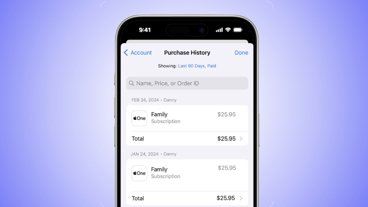Comcast's NBC deal could be roadblock for Apple's subscription hopes
This week, General Electric Company announced it had reached an agreement to sell NBC Universal to Comcast, the largest cable operator in the U.S. The $13.75 billion deal would give Comcast 51 percent ownership of NBC Universal, which was valued at $30 billion total per the terms of the agreement.
In November, rumors surfaced that Apple reached out to TV networks with a proposed $30-per-month subscription plan for TV episodes. Apple's proposal was not based on a specific piece of hardware, but the company allegedly plans to integrate subscriptions with the existing iTunes desktop software.
At the time, considered to be the most likely to participate was Disney, of which Apple co-founder Steve Jobs is the largest shareholder. Disney is also the owner of broadcast network ABC, and was the first to allow its content on iTunes to tremendous success.
Some believe that a new Comcast-owned NBC, however, would be unlikely to participate in an "all-you-can-eat" subscription plan. Wall Street analysts with Piper Jaffray have long predicted that Apple will attempt to secure the rights to a subscription TV deal eventually. But analysts told AppleInsider that they believe a Comcast-NBC merger would make an iTunes subscription with NBC content less likely.
The same sentiment was echoed by analyst Colin Dixon, of Diffusion Group, to Investor's Business Daily. If Apple comes to a Comcast-owned NBC looking for a content-related deal, he believes "they'll just say no."
In other words, this could present a potential scenario where Apple could offer a subscription TV deal lacking one of the four big U.S. broadcast networks. And still, there is no guarantee that CBS, Fox and even ABC are willing to deal.
Through the NBC deal, Comcast will also gain control of a number of prominent cable channels that produce original content, including USA Network, SyFy and Bravo. Content from all three cable networks, along with broadcast NBC, is currently available on iTunes.
NBC Universal had its share of issues with iTunes, long before Comcast entered the fold. In 2007, the company's chief executive, Jeff Zucker, urged his colleagues to take a stand against iTunes. He argued that the service undermined the ability of traditional media companies to set profitable rates for their content online. He said that Apple "destroyed the music business," and would do the same by mispricing video content.
But in 2008, the allure of 65 million viewers at iTunes proved too much for NBC Universal to stay away. After a year of absence from iTunes, the network brought its content back. In its time away, NBC had tried to create its own online TV market, but found little success.
 Neil Hughes
Neil Hughes













 Amber Neely
Amber Neely
 Thomas Sibilly
Thomas Sibilly
 AppleInsider Staff
AppleInsider Staff
 William Gallagher
William Gallagher
 Malcolm Owen
Malcolm Owen
 Christine McKee
Christine McKee










65 Comments
"destroyed the music business," they did a fine job of destroying their own business without the help of Apple.
Such ungrateful fools!
"destroyed the music business," they did a fine job of destroying their own business without the help of Apple.
Such ungrateful fools!
I don't think they're ungrateful, more like myopic. The networks laughed at a commercial free way of doing business in the late 70's, where people would pay a subscription to have commercial free broadcasts. That was called cable.
Eventually, ads came to that medium, too. When people decide to create online only "channels" for content, like HBO did for cable, maybe the big four will dissolve into the abyss. Or, they will get their act together and do something great. Time will tell.
It would be nice if companies that produce the content could directly market to Apple and sell there, away from the Big 3 and Fox. Then, Apple just turns into a market for whoever thinks they are good enough to produce content.
Given the poor quality of much of the downloadable content, I don't know if this is good or bad. But, I do like the idea of cutting out the middle man and letting the market decide which TV shows to keep in production. Quality would probably be maintained by the producers that would have to fun the content anyway.
Also, it would be interesting what Apple would do regarding rating systems.
I don't think they're ungrateful, more like myopic.
'myopic' good word I don't use enough.
Just remember a lot of government agencies have to Ok this deal before it is done.